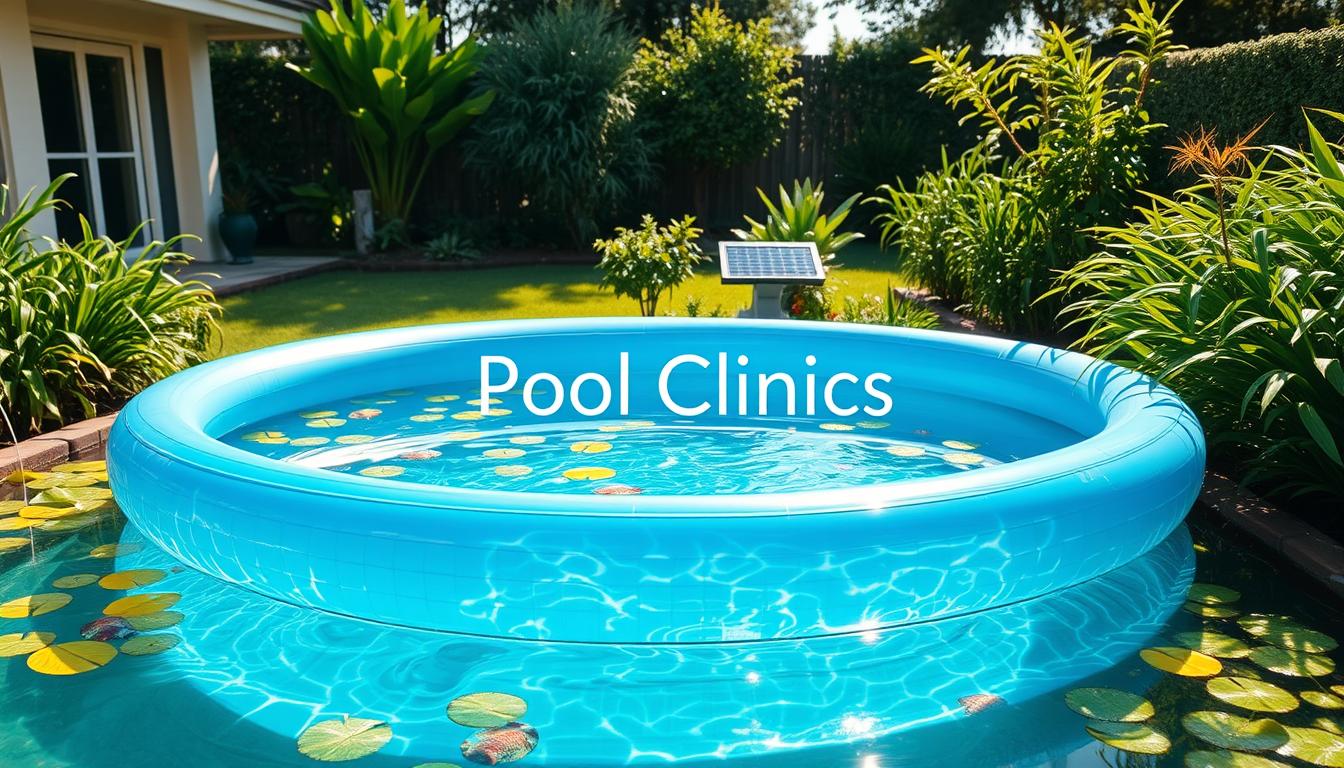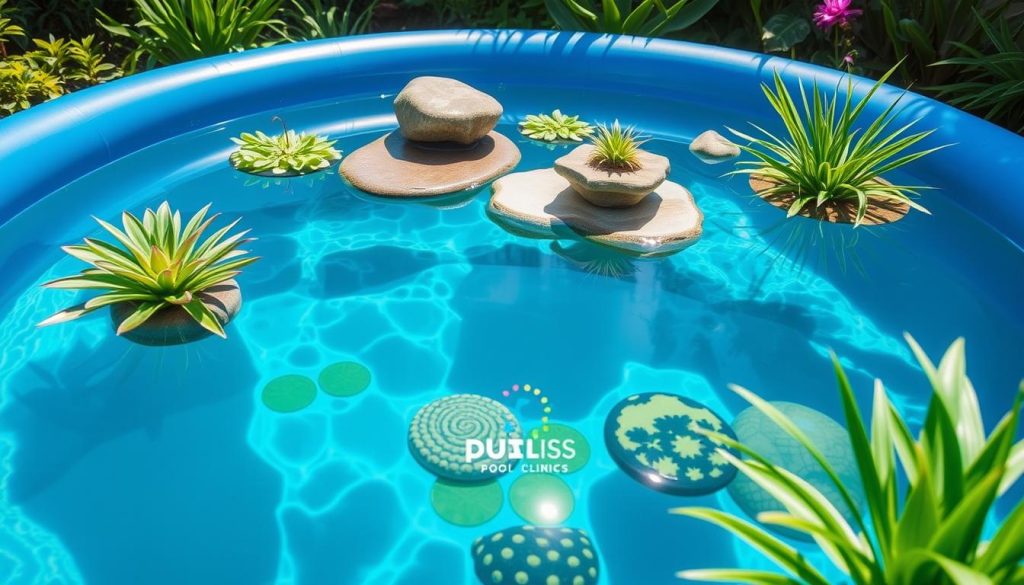
Summer’s here, and your inflatable pool beckons. Keeping the water clean without harsh chemicals is possible. Let’s explore eco-friendly ways to maintain your backyard oasis.
Your pool can stay pristine all season with simple, green techniques. These methods work for kiddie pools and larger wading pools alike.
Inflatable pools offer fun for the whole family. But they need proper care to avoid bacteria and algae growth. Natural methods can keep your pool water clean and inviting.
We’ll explore organic pool sanitization techniques. These include pool covers, regular skimming, and using baking soda and vinegar. These methods create a safer swim environment and support a greener lifestyle.
Chemical-free pool care is easier than you might think. With some know-how and effort, you’ll master it quickly. You’ll enjoy your pool without risking health or harming the environment.
Key Takeaways
- Maintain a clean inflatable pool without relying on harsh chemicals by implementing eco-friendly pool maintenance techniques.
- Utilize pool covers and regular skimming to prevent debris buildup and maintain clean pool water.
- Harness the power of baking soda and white vinegar to adjust pH levels and control algae growth naturally.
- Implement a regular cleaning schedule, encourage proper hygiene practices for swimmers, and maintain optimal water circulation for a pristine pool.
- Embrace organic pool sanitization methods to create a safer swimming environment and contribute to a greener, more sustainable lifestyle.
Natural Methods for Maintaining Clean Pool Water
Pool owners seek sustainable ways to keep inflatable pools clean and safe. Simple, natural pool water treatment methods ensure crystal-clear water all summer long. Let’s explore some effective techniques for a refreshing swim experience.

Using a Pool Cover to Prevent Debris Buildup
A pool cover is a top way to maintain clean water. It protects from UV rays and prevents debris buildup. This simple step reduces cleaning time and effort significantly.
Skimming the Water Surface Regularly
Daily skimming is crucial for green pool water clarification. It removes floating debris like leaves, insects, and small twigs. This prevents items from sinking and decomposing, which can cause algae growth.
The PoolWhale and Mowend Swimming Pool Skimmers are effective tools for this task. They help maintain clear water and reduce the need for chemical treatments.
| Pool Skimmer | Features | Price |
|---|---|---|
| PoolWhale Pool Skimmer | Durable net, telescopic pole, easy to use | $29.99 |
| Mowend Swimming Pool Skimmer | Fine mesh net, aluminum pole, lightweight | $34.99 |
Vacuuming the Pool Bottom to Remove Sediment
Vacuuming the pool bottom is vital for removing sunken sediment and debris. This non-toxic cleaning solution prevents organic matter buildup. Weekly vacuuming maintains clear water and reduces the need for chemicals.
“Regular skimming and vacuuming are key components of natural pool water treatment. By removing debris and sediment, pool owners can significantly reduce the likelihood of algae growth and maintain clearer, healthier water.”
These natural methods create a sustainable and enjoyable swimming environment. Next, we’ll explore using baking soda and vinegar as eco-friendly alternatives to conventional pool chemicals.
Harnessing the Power of Baking Soda and Vinegar
Baking soda and white vinegar can keep inflatable pools clean and balanced. These common household items offer an eco-friendly alternative to harsh chemicals. They maintain safe, chemical-free pool water effectively.
Adjusting pH Levels with Baking Soda
Baking soda regulates pH levels in inflatable pool water. It raises low pH levels, preventing acidic water that irritates skin and eyes. This creates a safer, more comfortable swimming environment.
To adjust pH, add 1.5 pounds of baking soda per 10,000 gallons of water. Let it circulate for a few hours, then retest. Repeat until pH reaches 7.2 to 7.8.
Controlling Algae Growth with White Vinegar
White vinegar helps control algae growth in inflatable pools. It prevents cloudy, uninviting water by creating an environment where algae struggle to thrive. This keeps pool water clear and clean.
Use one cup of white vinegar for every 100 gallons of water. Spread it evenly and let it circulate for several hours. The acetic acid prevents algae growth without harsh chemicals.
| Substance | Purpose | Application |
|---|---|---|
| Baking Soda | Adjusts pH Levels | 1.5 pounds per 10,000 gallons of water |
| White Vinegar | Controls Algae Growth | 1 cup per 100 gallons of water |
Using baking soda and white vinegar maintains clean, balanced pool water naturally. This approach benefits the environment and ensures safer swimming. It’s an effective alternative to chemical additives for inflatable pool maintenance.
Implementing a Regular Cleaning Schedule
A clean inflatable pool requires a consistent maintenance routine. Daily skimming removes debris from the water surface. Weekly cleaning of walls and floor, plus seasonal deep cleaning, are essential.
Following a well-planned schedule extends your pool’s life. This ensures crystal-clear water free from harmful bacteria. You’ll enjoy refreshing swims all summer long.
Encouraging Proper Hygiene Practices for Swimmers
Good swimmer hygiene reduces contaminants in pool water. Ask swimmers to shower before entering the pool. This removes sweat, oils, and lotions that pollute water.
Avoid swimming when ill or suffering from diarrhea. These can spread harmful bacteria quickly. Educate family and friends about proper pool hygiene.
Good practices minimize excessive cleaning needs. They also maintain a healthier swimming environment for everyone.
Maintaining Optimal Water Circulation
Proper water circulation keeps your pool clean. It prevents algae and bacteria growth. Run your filter pump daily if your pool has one.
For pools without filters, stir water manually with a brush or net. This distributes natural cleaners like baking soda or vinegar. It prevents stagnant areas where harmful organisms thrive.
Good circulation enhances cleaning efforts. It leads to a cleaner, safer swimming experience for all.







